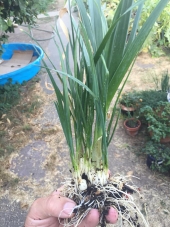

 44
44





Be joyful, though you have considered all the facts. ~Wendell Berry

 7
7




 2
2




“We can complain because rose bushes have thorns, or rejoice because thorn bushes have roses.” — Abraham Lincoln
 5
5




 1
1




“We can complain because rose bushes have thorns, or rejoice because thorn bushes have roses.” — Abraham Lincoln










 6
6




Jen Fulkerson wrote: From everything I have read the seeds should have been started in doors a couple of months ago. I was thinking I would plant 1/2 of the seeds and see what happens, and put what is left in the refrigerator, and plant them in the fall. I would love any advice, or info you have. Should I soak the seeds I'm going to plant first? Should I start them on a damp paper towel? Just plant them and see what happens? Excited to try something new. Thanks
Be joyful, though you have considered all the facts. ~Wendell Berry
 6
6




Moderator, Treatment Free Beekeepers group on Facebook.
https://www.facebook.com/groups/treatmentfreebeekeepers/





 5
5




Permaculture...picking the lock back to Eden since 1978.
Pics of my Forest Garden
 5
5




Permaculture...picking the lock back to Eden since 1978.
Pics of my Forest Garden
 7
7




Kim Goodwin wrote:
You can buy bulbs or seeds from these sources currently:
FullSkyFarm on Etsy sells bulbs and seeds from three varieties, including Green Mountain Potato onion bulbs and seeds from Full Sky Farm
Pecan Media: food forestry and forest garden ebooks
Now available: The Native Persimmon (centennial edition)










 4
4




Dan Boone wrote:
I have been growing nondescript green onions from the grocery store, which in this climate seem to be perennial -- they persist and flower for several years without ever seeming to die back. But they don't set seed, they don't multiply, and they aren't really an ideal crop, although I keep them around because they are completely idiot-proof, zero work, and any allium is better than none in hard times. They grow about four feet tall, the green stems are pretty tough and fibrous (except for new growth), and the white part is leek-shaped and quite variable: some are tough and fibrous, some are tender and sweet like a fine shallot.
Be joyful, though you have considered all the facts. ~Wendell Berry










 2
2




Be joyful, though you have considered all the facts. ~Wendell Berry




“We can complain because rose bushes have thorns, or rejoice because thorn bushes have roses.” — Abraham Lincoln
 3
3




Kim Goodwin wrote:If anyone finds more sources, please do post them in this thread. Potato onions are a crop that could easily disappear if people stop growing them. Knowledge can be completely lost in just one generation.
Blog: 5 Acres & A Dream
Books: Kikobian Books | Permies Digital Market
 5
5




Standing on the shoulders of giants. Giants with dirt under their nails








 2
2




Jen Fulkerson wrote:Thank goodness I only planted 1/2 my seeds because not one sprouted. I wish I would have started them in pots instead of in the garden. Oh well I will try again in the Fall. Good luck to everyone.
 2
2




 3
3




 1
1




If someone ever makes the Avengers of gardeners, my goal is to make that team!
 1
1








 1
1




Cathy James wrote:Does anyone know where I can get bulbs of the newer, larger-bulbed potato onions that produce true seed more frequently?
 1
1




Dan Boone wrote:
It seems to me [potato onions] might easily replace my "monster green onions" as a low-effort perennial allium that's closer to "real onions".
I don't grow "real onions" because I've had bad luck with them; they are likely to be puny and never bulb out or bolt (again, not bulbing out) under the conditions where I grow them.




Faber vanmolkot wrote:
I have the same problem,
I live in Belgium (Europe) and I can’t [seem to] find [potato] onions. Let alone the larger bulbs.
Any tips?




If someone ever makes the Avengers of gardeners, my goal is to make that team!
 1
1








Aimee Hall wrote:I never tried soaking my bulbs in the bleach water solution. I think I will try that when I plant mine out here, do you rinse them off after soaking them or plant them straight after soaking?
Best of luck with your new perennial onions, Cathy!




 1
1












 6
6




 8
8









My new Perma Veggies book is available now and it's FREE!
https://plantonce.com/
 5
5




Standing on the shoulders of giants. Giants with dirt under their nails
 2
2




My new Perma Veggies book is available now and it's FREE!
https://plantonce.com/
 1
1




 1
1





|
And then the entire population worshiped me like unto a god. Well, me and this tiny ad:
The new purple deck of permaculture playing cards
https://www.kickstarter.com/projects/paulwheaton/garden-cards
|






